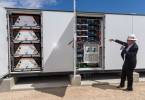Average power bills could rise $15 on Jan. 1
The average monthly single-family residential power bill could go from $140 to $155 on Jan. 1.
But don't hold us to that number. Don't hold the Public Utilities Commission of Nevada to it, either. Or NV Energy, or the state Bureau of Consumer Protection, for that matter.
That's because that number is more guess than hard figure right now, as all of those parties spend the next few days digesting the commission's 242-page order in NV Energy's general rate case.
The commission on Wednesday disallowed big chunks of NV Energy's request for higher revenue to cover power plant construction costs, operating expenses and higher investor returns. The commission nixed $46 million for a new computer system, demanded a 4 percent cut in salary costs and slashed the company's allowed, maximum return on equity from 10.5 percent to 10 percent.
Though NV Energy asked for $249 million in additional annual revenue on a current base of
$2.2 billion a year, the company will get considerably less than that, observers agreed.
NV Energy President and CEO Michael Yackira said he thought the company would get less than $180 million a year, or the amount of a fuel cost-based rate decrease that went into effect on Oct. 1. That means power bills probably won't rise back in January to where they were before Oct. 1, even with Wednesday's order, Yackira said.
State consumer advocate Eric Witkoski, who represents ratepayers in utility rate cases, said he thinks the company may get just $150 million or so in added annual revenue for the next three years. He said that would translate into a 15 percent increase in residential single-family rates.
Commissioner Rebecca Wagner told a ratepayer during a consumer session after Wednesday's hearing that she thought the agency's decision would result in an average rate increase of around
7 percent for all power-user classes, both commercial and residential.
ADDRESSING THE RESIDENTIAL SUBSIDY
But here's where it gets tricky: Single-family residential ratepayers now pay less in rates than it costs to serve them, and commercial users pick up the difference. The commission wants to phase out that subsidy, so single-family residential ratepayers would pay an additional
4 percent to start whittling away at the support.
"We struggled really hard on addressing the residential subsidy," Wagner said. "We need to not only be fair to ratepayers and balance their needs with shareholders', but we need to be fair across all classes of customers. We don't want it unbalanced in either way. Left over time, (the subsidy) becomes a lot of money, and it becomes a significant fairness issue, in my opinion."
Accounting for the subsidy phaseout, that would make for a total rate increase of 11 percent, or $15.40 a month on the current $140 average monthly bill, for single-family residential power users.
Wagner equivocated on those rates, though.
"That will change. I can guarantee you, by the mere fact that I'm saying that (rate) is right, that it's going to be wrong because that's just my luck," she said. "But NV Energy will calculate it through their model, and our staff will verify those calculations, and we should have a trued-up, accurate amount within the next few days."
The commission pored through thousands of pages of filings and listened to weeks of testimony in summer and fall and trimmed "as much fat as we possibly could" from the final rate, Wagner said.
She added that the commission "struggled to make as many reductions as we could that were justified."
Yackira countered that he didn't think there was any fat to cut.
"We have done a lot to trim costs, investing in energy-efficient power plants and increasing efficiencies across the board," Yackira said. "We certainly didn't have any fat in the case."
FOCUSED ON RETURN ON INVESTMENT
For NV Energy, said Yackira, the case was about company investors getting a return on investments they made in power plants, including the Clark Peakers plant, which came on line in 2008, and the Harry Allen expansion, which went live in May.
"Customers have been beneficiaries of those plants since they came in service, so it was time for investors to start making a return and also to recover those investment costs," he said.
Still, Yackira said the commission "did a very good job" understanding what was in the case.
"I'm certainly satisfied with the way the commission deliberated and with the case we put forward," he added.
Witkoski also said he appreciated parts of the commission's decision. Cutting salaries, keeping the new computer system out of rates for now and cutting returns on equity were all on Witkoski's wish list.
It will be 2014 before NV Energy files its next general rate case, as state law requires.
So next up on the commission's agenda is a new look at that residential single-family subsidy.
With NV Energy's plant-purchasing and construction plans complete and population growth slower for the foreseeable future, it's time to re-evaluate whether residential ratepayers really are slacking on covering their costs, Commissioner Alaina Burtenshaw said.
Witkoski said he applauded the move to investigate the subsidy. The investigation should happen in 2012.
Contact reporter Jennifer Robison at
jrobison@reviewjournal.com or 702-380-4512.























